TheoriesofReadin_省略_ofEnglishReading_陈春梅 (1)
- 格式:pdf
- 大小:1.53 MB
- 文档页数:4
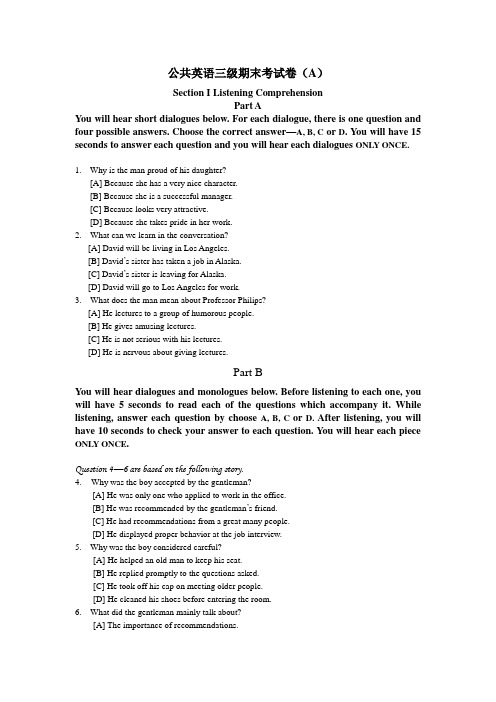
公共英语三级期末考试卷(A)Section I Listening ComprehensionPart AYou will hear short dialogues below. For each dialogue, there is one question and four possible answers. Choose the correct answer—A, B, C or D. You will have 15 seconds to answer each question and you will hear each dialogues ONLY ONCE.1.Why is the man proud of his daughter?[A] Because she has a very nice character.[B] Because she is a successful manager.[C] Because looks very attractive.[D] Because she takes pride in her work.2. What can we learn in the conversation?[A] David will be living in Los Angeles.[B] David’s sister has taken a job in Alaska.[C] David’s sister is leaving for Alaska.[D] David will go to Los Angeles for work.3. What does the man mean about Professor Philips?[A] He lectures to a group of humorous people.[B] He gives amusing lectures.[C] He is not serious with his lectures.[D] He is nervous about giving lectures.Part BYou will hear dialogues and monologues below. Before listening to each one, you will have 5 seconds to read each of the questions which accompany it. While listening, answer each question by choose A, B, C or D. After listening, you will have 10 seconds to check your answer to each question. You will hear each piece ONLY ONCE.Question 4—6 are based on the following story.4.Why was the boy accepted by the gentleman?[A] He was only one who applied to work in the office.[B] He was recommended by the gentleman’s friend.[C] He had recommendations from a great many people.[D] He displayed proper behavior at the job interview.5. Why was the boy considered careful?[A] He helped an old man to keep his seat.[B] He replied promptly to the questions asked.[C] He took off his cap on meeting older people.[D] He cleaned his shoes before entering the room.6. What did the gentleman mainly talk about?[A] The importance of recommendations.[B] What matters in a job interview.[C] The significance of a good job.[D] What makes a successful boss.Question 7—10are based on the following story.7.What is the story mainly about?[A] True human love.[B] Life and death.[C] Safety measures.[D] Tragic voyages.8. Who was Mabel Bird?[A] Mrs. Straus’ s maid.[B] Mr. Straus’ s friend.[C] Mrs. Straus’ s sister.[D] Mr. Straus’ s wife.9. What did Mrs. Straus refuse to do?[A] To leave her children.[B] To go where her husband went.[C] To step into a lifeboat.[D] To stay where her husband was.10. Why didn’t Mrs. Straus survive?[A] She was not willing to leave her husband.[B] She did not have time to leave the boat.[C] She was too frightened to move away.[D] She did not think of her own safety.Section II Use of EnglishRead the following text. Choose the best word or phrase for each numbered blank.Many theories concerning the causes of juvenile delinquency (crimes committed by young people) focus either on the individual or on society as the major contributing influence. Theories __11__ on the individual suggest that children engage in criminal behavior __12__ they were not sufficiently penalized for previous misdeeds or that they have learned criminal behavior through __13__ with others. Theories focusing on the role of society suggest that children commit crimes in __14__ to their failure to rise above their socioeconomic status, __15__ as a rejection of middle-class values.Most theories of juvenile delinquency have focused on children from disadvantaged families, __16__ the fact that children from wealthy homes also commit crimes. The latter may commit crimes __17__ lack of adequate parental control. All theories, however, are tentative and are __18__ to criticism.Changes in the social structure may indirectly __19__ juvenile crime rates. For example, changes in the economy that __20__ to fewer job opportunities for youth and rising unemployment __21__ make gainful employment increasingly difficult to obtain. The resultingdiscontent may in __22__ lead more youths into criminal behavior.Families have also __23__ changes these years. More families consist of one parent households or two working parents; __24__, children are likely to have less supervision at home __25__ in the traditional family __26__. This lack of parental supervision is thought to be an influence on juvenile crime rates. Other __27__ causes of offensive acts include frustration or failure in school, the increased __28__ of drugs and alcohol, and the growing __29__ of child abuse and child neglect. All these conditions tend to increase the probability of a child committinga criminal act, __30__ a direct causal relationship has not yet been established.11. [A] acting [B] centering [C] relying [D] commenting12. [A] before [B] unless [C] until [D] because13. [A] cooperation [B] assimilation [C] interactions [D] consultation14. [A] return [B] reply [C] reference [D] response15. [A] or [B] but rather [C] but [D] or else16. [A] considering [B] ignoring [C] highlighting [D] discarding17. [A] on [B] in [C] for [D] with18. [A] subject [B] resistant [C] sensitive [D] immune19. [A] affect [B] reduce [C] check [D] reflect20. [A] point [B] lead [C] come [D] amount21. [A] in general [B] on average [C] by contrast [D] at length22. [A] case [B] short [C] turn [D] essence23. [A] survived [B] noticed [C] undertaken [D] experienced24. [A] contrarily [B] consequently [C] similarly [D] simultaneously25. [A] than [B] that [C] which [D] as26. [A] system [B] structure [C] concept [D] heritage27. [A] assessable [B] incredible [C] negligible [D] identifiable28. [A] expense [B] restriction [C] allocation [D] availability29. [A] incidence [B] awareness [C] exposure [D] popularity30. [A] provided [B] since [C] although [D] supposingSection III Reading ComprehensionRead the following text. Answer the questions by choosing A, B, C or D.People all over the world today are beginning to hear and learn more and more about the problem of pollution. Pollution is caused either by man’s release of completely new and often artificial substances into the environment or by releasing greatly increased amounts of a natural substance, such as oil from oil tankers into the sea.The whole industrial process which makes many of the goods and machines we need and use in our daily lives, is bound to create a number of waste products which upset the environmental balance. Many of these waste products can be prevented for disposed of sensibly, but clearly while more and more new and complex goods are produced there will be new, dangerous waste to be disposed of, for example, the waste products from nuclear power stations. Many people, therefore, see pollution only part of a larger and more complex problem, that is, the whole process of industrial production and consumption of goods. Others again see the problem mainly in connection with agriculture, where new methods are helping farmers grow more and more on theirland to feed our ever-increasing populations. However, the land itself is gradually becoming worn out as it is being used, in some cases, too heavily, and artificial fertilizers cannot restore the balance.Whatever its underlying reasons, there is no doubt that much of the pollution caused could be controlled if any companies, individuals and governments would make more efforts. In the home there is an obvious need to control litter and waste. Food comes wrapped up three or four times in packages that all have to be disposed of; drinks are increasingly sold in bottles or cans which cannot be reused. These not only cause a litter problem, but also are a great waste of resources, in terms of glass, metals and paper. Advertising has helped this process by persuading many of us not only to buy things that we neither want nor need, but also to throw away much of what we do buy. Pollution and waste combine to be a problem everyone can help solve by cutting out unnecessary buying, excess consumption and careless disposal of the products we use in our daily lives.31. The text is mainly about _______.[A] the causes and preventive measures of pollution[B] the impacts of pollution on agricultural production[C] the role of advertising in the control of pollution[D] the link between the industrial process and pollution32. According to some people, the environmental balance is upset because ________.[A] pollutions have greatly increased[B] resources have gradually decreased[C] industrialization produces dangerous wastes[D] agriculture leads to the wrong use of land33. Many people are of the opinion that pollution cannot be ________.[A] prevented sensibly [B] controlled with ease[C] viewed as complicated [D] looked at in isolation34. With respect to fighting pollution it is implied that ________.[A] litter is obviously under control [B] efforts made are far from enough[C] governments need to take the lead [D] packaging of food must be stopped35. Advertising helps to cause pollution in that it encourages unnecessary ________.[A] wrapping [B] processing [C] consumption [D] productionAt political gatherings, he is treated like a pop star. Young girls scream, young men shouted his name and everyone from small children to the elderly pushes closer to get a glimpse of the man. For the last four years, in stadiums and community halls, on farms and on soccer fields, Nelson Mandela has traveled South Africa and the world promoting his vision of racial reconciliation. His tireless campaigning and his insistent commitment to the cause of non-racialism have won him a Nobel Prize and made him a global symbol of hope in the post-Cold-War era of ethnic conflicts and instability. But now with the election behind him, Mandela must transform the dream that has sustained him into the reality of a new, multi-racial South Africa.In the four years since he emerged from prison, he has led the push for democracy with a determination and vision that have left his leadership unchallenged. Although he lives in a suburb of Johannesburg, where the upper class lives, he has retained the respect of his country’s poor masses. He has met with the general staffs of both the South African defense force and the national police force, which some suspect has secretly cooperated with white extremists, and alsoheld talks with leaders of the right wing. Talking to foreign reporters last week, Mandela said he does not intend to ban the extremist white organizations the way the former government banned his organization, the African National Congress. At the same time, however, Mandela made it clear that he will not tolerate disobedience in his government.Tall and dignified, with the erect bearing of a king, Mandela seems destined to become the President. “Right from the outset Nelson had a presence; he always made an impression on anybody that met him because of his sincerity and strong will,” says one activist who has known Mandela since the 1940s, when he emerged as an energetic young figure on the political and social scenes.36. By the time the text was published, Nelson Mandela’s official position had been _______.[A] the South African President-elect[B] a candidate for South African President[C] the South African President[D] a nominee for Nobel Peace Prize37. The author mentions all of the following facts about Nelson Mandela EXCEPT that _______.[A] he is a Nobel Prize winner[B] he is a former prisoner[C] he is a South African pop star[D] he is tall and dignified38. Nelson Mandela has won the admiration of the South African people especially because he_______.[A] loves all the people [B] travels and speaks[C] behaves like a pop star [D] fights against racism39. According to the article, in the four years after he got out of prison Mandela did not ________.[A] oppose racial tolerance in public [B] lead a movement for democracy[C] hold talks with foreign reporters [D] ban extremist white organizations40. In the last paragraph, means “right from the outset” ________.[A] at the first sight [B] right from the outside[C] at the very beginning [D] right from the appearanceFifteen years ago, I entered the Boston Globe, which was a temple to me then. It wasn’t easy getting hired. But once you were there, I found, you were in.Globe jobs were for life guaranteed until retirement. For 15 years I had prospered there—moving from an ordinary reporter to foreign correspondent and finally to senior editor. I would have a lifetime of security if I stuck with it. Instead, I had made a decision to leave. I entered my boss’s of- rice. Would he rage? I wondered. He had a famous temper. “Matt, we have to have a talk.” I began awkwardly. “I came to the Globe when I was twenty-four. Now I’ m forty. There’s a lot I want to do in life. I’m resigning.”“To another paper?”he asked. I reached into my coat po cket, but didn’t say anything. I handed him a letter that explained everything. It said that I was leaving to start a new media company. We were at a rare turning point in history. I wanted to be directly engaged in the change. “I’m glad for you,” he said, quite out of my expectation. “I just came from a board of directors meeting and it was seventy-five percent discouraging news. Some of that we can deal with. But much of it we can’t,” he went on. “I wish you all the luck in the world,” he concluded. “And if it doesn’t work out, remember, your star is always high here.”Then I went out of his office, walking through the newsroom for more good-byes. Everybodywas saying congratulations. Everybody--even though I’d be risking all on an unfamiliar venture: all the financial security I had carefully built up.Later, I had a final talk with Bill Taylor, chairman and publisher of the Boston Globe. He had turned the Globe into a billion-dollar property. “I’m resigning, Bill,” I said. He listened while I gave him the story. He wasn’t looking angry or dismayed either. After a pause, he said, “Golly, I wish I were in your shoes.”41. From the passage we know that the Globe is a famous ________.[ A ] newspaper [ B ] magazine [ C ] temple [ D ] church42. If the writer stayed with the Globe _________.[ A ] he would be able to realize his lifetime dreams[ B ] he would let his long-cherished dreams fade away[ C ] he would never have to worry about his future life[ D ] he would never be allowed to develop his ambitions43. The writer wanted to resign because _________.[ A ] he had serious trouble with his boss[ B ] he got underpaid at his job for the Globe[ C ] he wanted to be engaged in the new media industry[ D ] he had found a better paid job in a publishing house44. When the writer decided to resign, the Globe was faced with _________.[ A ] a trouble, with its staff members [ B ] a shortage of qualified reporters[ C ] an unfavorable business situation [ D ] an uncontrollable business situation 45. By “I wish I were in your shoes.” ( in the last paragraph ), Bill Taylor meant that _________.[ A ] the writer was to fail [ B ] the writer was stupid[ C ] he would do the same if possible [ D ] he would reject the writer’s requestSection IV WritingWrite an essay of 120 words on A Real Friend. Your essay should include:1.different views about what a real friend is2.your opinion of a friend3.the way to find a real friend答题卷专业____________ 班级____________ 姓名____________ 得分____________1. [A] [B] [C] [D]2. [A] [B] [C] [D]3. [A] [B] [C] [D]4. [A] [B] [C] [D]5. [A] [B] [C] [D]6. [A] [B] [C] [D]7. [A] [B] [C] [D]8. [A] [B] [C] [D]9. [A] [B] [C] [D] 10. [A] [B] [C] [D]11. [A] [B] [C] [D] 12. [A] [B] [C] [D] 13. [A] [B] [C] [D] 14. [A] [B] [C] [D] 15. [A] [B] [C] [D] 16. [A] [B] [C] [D] 17. [A] [B] [C] [D] 18. [A] [B] [C] [D] 19. [A] [B] [C] [D] 20. [A] [B] [C] [D] 21. [A] [B] [C] [D] 22. [A] [B] [C] [D] 23. [A] [B] [C] [D] 24. [A] [B] [C] [D] 25. [A] [B] [C] [D] 26. [A] [B] [C] [D] 27. [A] [B] [C] [D] 28. [A] [B] [C] [D] 29. [A] [B] [C] [D] 30. [A] [B] [C] [D]31. [A] [B] [C] [D] 32. [A] [B] [C] [D] 33. [A] [B] [C] [D] 34. [A] [B] [C] [D] 35. [A] [B] [C] [D] 36. [A] [B] [C] [D] 37. [A] [B] [C] [D] 38. [A] [B] [C] [D] 39. [A] [B] [C] [D] 40. [A] [B] [C] [D] 41. [A] [B] [C] [D] 42. [A] [B] [C] [D] 43. [A] [B] [C] [D] 44. [A] [B] [C] [D] 45. [A] [B] [C] [D]_______________________________________。
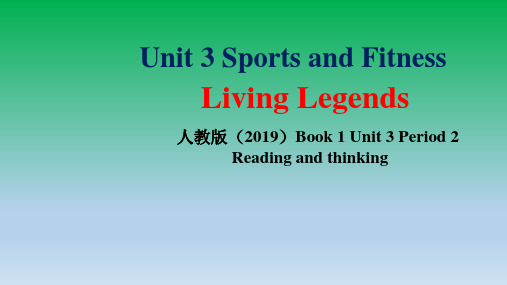
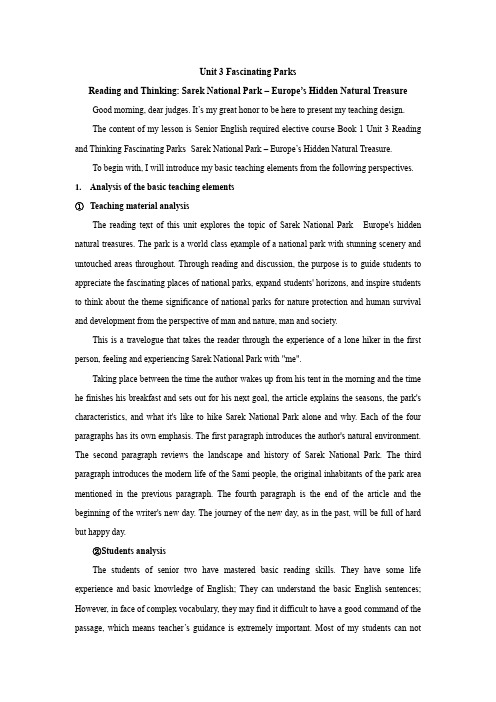
Unit 3 Fascinating ParksReading and Thinking: Sarek National Park – Europe’s Hidden Natural Treasure Good morning, dear judges. It’s my great honor to be here to present my teaching design.The content of my lesson is Senior English required elective course Book 1 Unit 3 Reading and Thinking Fascinating Parks- Sarek National Park – Europe’s Hidden Natural Treasure.To begin with, I will introduce my basic teaching elements from the following perspectives.1.Analysis of the basic teaching elements①Teaching material analysisThe reading text of this unit explores the topic of Sarek National Park -Europe's hidden natural treasures. The park is a world class example of a national park with stunning scenery and untouched areas throughout. Through reading and discussion, the purpose is to guide students to appreciate the fascinating places of national parks, expand students' horizons, and inspire students to think about the theme significance of national parks for nature protection and human survival and development from the perspective of man and nature, man and society.This is a travelogue that takes the reader through the experience of a lone hiker in the first person, feeling and experiencing Sarek National Park with "me".Taking place between the time the author wakes up from his tent in the morning and the time he finishes his breakfast and sets out for his next goal, the article explains the seasons, the park's characteristics, and what it's like to hike Sarek National Park alone and why. Each of the four paragraphs has its own emphasis. The first paragraph introduces the author's natural environment. The second paragraph reviews the landscape and history of Sarek National Park. The third paragraph introduces the modern life of the Sami people, the original inhabitants of the park area mentioned in the previous paragraph. The fourth paragraph is the end of the article and the beginning of the writer's new day. The journey of the new day, as in the past, will be full of hard but happy day.②Students analysisThe students of senior two have mastered basic reading skills. They have some life experience and basic knowledge of English; They can understand the basic English sentences; However, in face of complex vocabulary, they may find it difficult to have a good command of the passage, which means teacher’s guidance is extremely important. Most of my students can notexpress themselves appropriately because their vocabulary is quite limited. Moreover, Their learning attitude and motivation is not clear.③Analysis of the teaching objectivesIn order to promote the development of every student, the teaching objectives are listed in the following parts.1. Through prediction and skimming, understand the general idea and establish the information association between the title, picture and the text.2. Read the text carefully to find the main points of each paragraph, and correctly match the subheadings to further understand the text information.3. Through text analysis, focus on the author's experience, extract information from sensory experience, experience the author's inner harvest, and deeply understand the text content.4. Through an overview of the author's experience, evaluate the author's choice of words and sentences, appreciate the implied meaning, and deepen the understanding of the subject from the content, language and thinking.④analysis of teaching important and difficult points1. Raise the awareness of western culture.2. Improve the reading skills.3. Enhance cooperation ability.⑤Analysis of the teaching methods and learning methodsTo achieve the teaching objectives, there are three teaching methods used in this lesson. They are situational teaching method, task-based language teaching method and communicative teaching method. As for the learning method, students will be encouraged to adopt cooperative learning method to enhance their cooperative awareness.2.Presentation of the theoriesThe design of this class is based on two teaching theories:♦Product-oriented approach♦The curriculum standard3.Analysis of the teaching proceduresStep 1: Pre-reading1).A brainstorm of parks.Q: What comes to your mind first when you think of parks?A fun place, the West Lake, beautiful scenery, national parks, theme parks, scary rollercoasters, educational ……2). Talk about national parks.Q1: Now look at the picture on the screen and tell me how this park makes you feel?I feel fascinated by the colourful water in the park. It’s also mysterious and I wonder what makes the water so colorful.Q2: How do you relate the quote to the picture? What does Michael Frome mean by “a sanctuary for nature and for humans who will accept nature on nature’s own terms”?People can enjoy such a natural beauty as the Grand Prismatic Spring only if it’s protected and kept in natural state. From Michael Frome’s quote, we learn a national park is a place where we should live in harmony with nature.[Design intention] Brainstorm around "parks", elicit unit themes, activate students' known information, pay particular attention to the keywords describing students' experience of going to parks and physical and mental experience, and write on the blackboard; Use the pictures on the front page of the unit to allow students to imagine possible experiences, and encourage students to describe them from a variety of senses; Finally, with pictures, let the students talk about their understanding of this famous saying, and then have a preliminary understanding of national parks, and stimulate students' desire to read.Step 2 While-readingTask 1Predict through the title and the pictures.1.What does the text mainly tell us?The text mainly tells us about the_Sarek_National_Park_located_in_Sweden.2.Where is the article probably from?A.An ad.B.A magazine.C.A story. D.A brochure.答案:B[Design intention] Students interpret the title according to the title and pictures, understand the author's writing intention, and predict the text content to form reading expectations. Then, by reading the text quickly, we can get the general idea of the text, and verify whether the prediction is correct, which lays the foundation for the subsequent deep understanding.Task 2 Reading to match the subheadings with the paragraphsT: Subheadings give a short summary of what is in a section of a passage. Now read the text and find a proper subheading for each paragraph. Give reasons for your choices.【Design intention 】Students should read carefully, summarize the general idea of the paragraphs, grasp the key points of each paragraph, and reasonably match the subheadings. Comb through the information that introduces the national park and describes the author's experience, read the text deeply, pay attention to the language, and understand the key words and expressions in each paragraph.[Core quality Improvement point] Students can understand and think, improve the ability to summarize, train logical thinking, grasp the attitude of the author, and understand the humanistic connotation.Task 3 detailed reading1.Why was Sarek made a national park?A.Because the traditional way of life could be kept.B.Because the land could keep the original state.C.Because Sami people banned all new development.D.Because reindeer could feed on grass.2.Which of the following is TRUE according to the text?A.You can see the sun all the year above the Arctic Circle.B.The Sami are still on the move.C.Many people have lived in the park.D.Sami are allowed to continue their traditional way of life in the park.3.What does the author think of his travel to the park?A.Hard and tired.B.Sleepless and peaceful.C.Enjoyable and adventurous.D.Tired and beautiful.答案:1.B 2.D 3.CStep3 Post-reading: Further Thinking1.Why is Sarek National Park a “hidden natural treasure”?I’m in the remote far south of Sweden in Sarek National Park, a place with no roads or towns. (Para. 1)Getting here is quite difficult, so apart from the Sami very few people have ever seen Sarek. (Para. 2)Though the Sami are allowed to continue their traditional way of life in the park, no one else can live here, and all new development is banned within park boundaries. (Para. 2)2.What does the author think of the journey in the Sarek?Though it is full of sweat and hard work, it is totally worth it, because being in such a beautiful and wild place makes the author feel blessed to be alive. And the author is totally enjoying a great adventure.3. What is the relationship between human and nature in the Sarek like?Man at Peace with Nature. They live quite harmoniously with each other.Step 4 Assignment:Review what you have learned about the writer’s experience and think about whether you would like to visit Sarek. Give your reasons.[Design intention] Students start from the author's experience, return to the author's experience, review the text content, and consolidate the text vocabulary. At the same time, it also connects with the students themselves to inspire reflection on the journey of life.【Core quality improvement point 】Exercise logical thinking and divergent thinking; Improve your verbal skills.4. Blackboard designThe blackboard design is one of the highlight of the whole class. By experiencing that changefrom nothing to a whole one, students can have a better understanding of the text and internalize the information actively.。
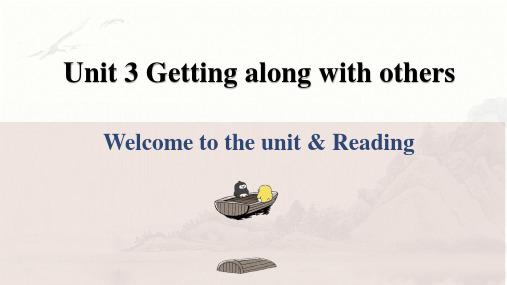
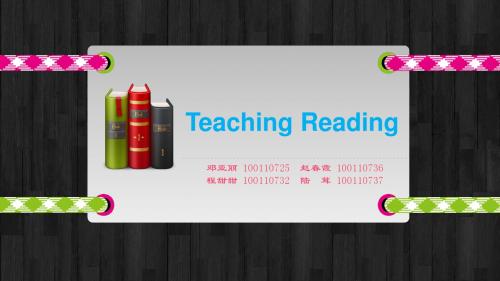
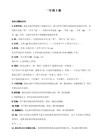
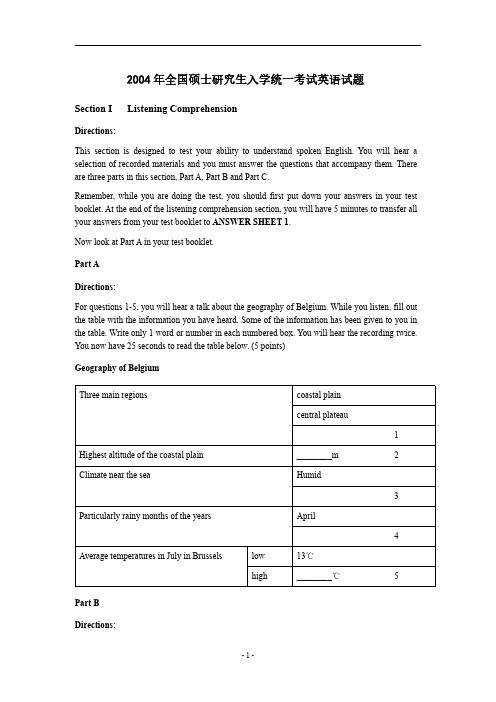
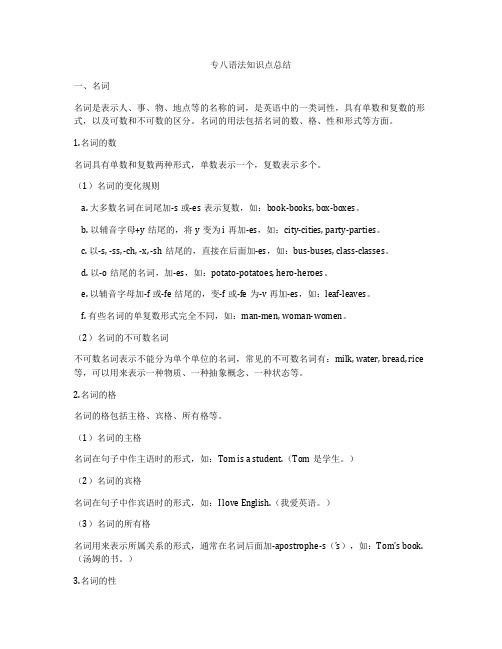
专八语法知识点总结一、名词名词是表示人、事、物、地点等的名称的词,是英语中的一类词性,具有单数和复数的形式,以及可数和不可数的区分。
名词的用法包括名词的数、格、性和形式等方面。
1.名词的数名词具有单数和复数两种形式,单数表示一个,复数表示多个。
(1)名词的变化规则a. 大多数名词在词尾加-s或-es表示复数,如:book-books, box-boxes。
b. 以辅音字母+y结尾的,将y变为i再加-es,如:city-cities, party-parties。
c. 以-s, -ss, -ch, -x, -sh结尾的,直接在后面加-es,如:bus-buses, class-classes。
d. 以-o结尾的名词,加-es,如:potato-potatoes, hero-heroes。
e. 以辅音字母加-f或-fe结尾的,变-f或-fe为-v再加-es,如:leaf-leaves。
f. 有些名词的单复数形式完全不同,如:man-men, woman-women。
(2)名词的不可数名词不可数名词表示不能分为单个单位的名词,常见的不可数名词有:milk, water, bread, rice 等,可以用来表示一种物质、一种抽象概念、一种状态等。
2.名词的格名词的格包括主格、宾格、所有格等。
(1)名词的主格名词在句子中作主语时的形式,如:Tom is a student.(Tom是学生。
)(2)名词的宾格名词在句子中作宾语时的形式,如:I love English.(我爱英语。
)(3)名词的所有格名词用来表示所属关系的形式,通常在名词后面加-apostrophe-s(’s),如:Tom’s book.(汤姆的书。
)3.名词的性名词有两种性:阳性和阴性,阳性表示男性和雄性,阴性表示女性和雌性。
4.名词的形式名词的形式包括普通名词(common nouns)、专有名词(proper nouns)、抽象名词(abstract nouns)、集体名词(collective nouns)等。
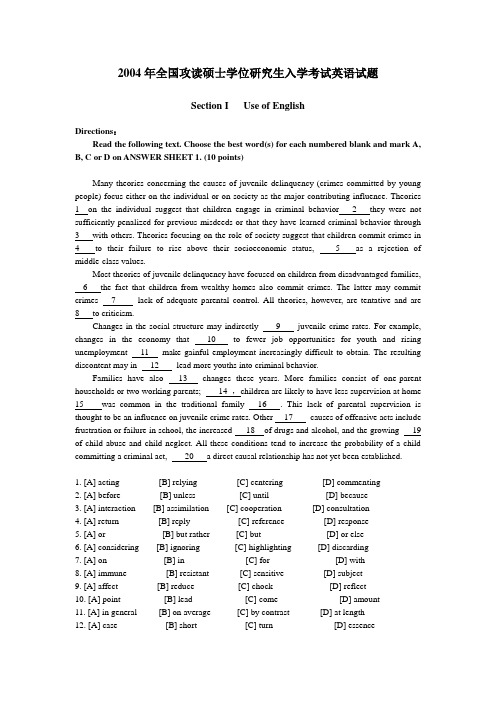
2004年全国攻读硕士学位研究生入学考试英语试题Section I Use of EnglishDirections:Read the following text. Choose the best word(s) for each numbered blank and mark A, B, C or D on ANSWER SHEET 1. (10 points)Many theories concerning the causes of juvenile delinquency (crimes committed by young people) focus either on the individual or on society as the major contributing influence. Theories 1 on the individual suggest that children engage in criminal behavior 2 they were not sufficiently penalized for previous misdeeds or that they have learned criminal behavior through3 with others. Theories focusing on the role of society suggest that children commit crimes in4 to their failure to rise above their socioeconomic status,5 as a rejection of middle-class values.Most theories of juvenile delinquency have focused on children from disadvantaged families, _ 6 the fact that children from wealthy homes also commit crimes. The latter may commit crimes 7 lack of adequate parental control. All theories, however, are tentative and are 8 to criticism.Changes in the social structure may indirectly 9 juvenile crime rates. For example, changes in the economy that 10 to fewer job opportunities for youth and rising unemployment 11 make gainful employment increasingly difficult to obtain. The resulting discontent may in 12 lead more youths into criminal behavior.Families have also 13 changes these years. More families consist of one-parent households or two working parents; 14 ,children are likely to have less supervision at home 15 was common in the traditional family 16 . This lack of parental supervision is thought to be an influence on juvenile crime rates. Other __17_ causes of offensive acts include frustration or failure in school, the increased __ 18 _ of drugs and alcohol, and the growing 19 of child abuse and child neglect. All these conditions tend to increase the probability of a child committing a criminal act, 20 a direct causal relationship has not yet been established.1. [A] acting [B] relying [C] centering [D] commenting2. [A] before [B] unless [C] until [D] because3. [A] interaction [B] assimilation [C] cooperation [D] consultation4. [A] return [B] reply [C] reference [D] response5. [A] or [B] but rather [C] but [D] or else6. [A] considering [B] ignoring [C] highlighting [D] discarding7. [A] on [B] in [C] for [D] with8. [A] immune [B] resistant [C] sensitive [D] subject9. [A] affect [B] reduce [C] chock [D] reflect10. [A] point [B] lead [C] come [D] amount11. [A] in general [B] on average [C] by contrast [D] at length12. [A] case [B] short [C] turn [D] essence13. [A] survived [B] noticed [C] undertaken [D] experienced14.[A] contrarily [B] consequently [C] similarly [D] simultaneously15. [A] than [B] that [C] which [D] as16. [A] system [B] structure [C] concept [D] heritage17. [A] assessable [B] identifiable [C] negligible [D] incredible18. [A] expense [B] restriction [C] allocation [D] availability19. [A] incidence [B] awareness [C] exposure [D] popularity20. [A] provided [B] since [C] although [D] supposingSection II Reading ComprehensionPart ADirections:Read the following four texts. Answer the questions below each text by choosing [A], [B], [C] or [D]. Mark your answers on ANSWER SHEET 1. (40 points)Text 1Hunting for a job late last year, lawyer Gant Redmon stumbled across CareerBuilder, a job database on the Internet. He searched it with no success but was attracted by the site’s “personal search agent”. It’s an interactive feature that lets visitors key in job criteria such as location, title, and salary, then E-mails them when a matching position is posted in the database. Redmon chose the keywords legal, intellectual property and Washington, D.C. Three weeks later, he got his first notific ation of an opening. “I struck gold,” says Redmon, who E-mailed his resume to the employer and won a position as in-house counsel for a company.With thousands of career-related sites on the Internet, finding promising openings can he time-consuming and inefficient. Search agents reduce the need for repeated visits to the databases. But although a search agent worked for Redmon, career experts see drawbacks. Narrowing your criteria, for example, may work against you: “Every time you answer a question you e liminate a possibility,” says one expert.For any job search, you should start with a narrow concept—what you think you want to do—then broaden it. “None of these programs do that,” says another expert. “There’s no career counseling implicit in all of thi s.” Instead, the best strategy is to use the agent as a kind of tip service to keep abreast of jobs in a particular database; when you get E-mail, consider it a reminder to check the database again. “I would not rely on agents for finding everything that i s added to a database that might interest me,” says the author of a job-searching guide.Some sites design their agents to tempt job hunters to return. When CareerSite’s agent sends out messages to those who have signed up for its service, for example, it includes only three potential jobs—those it considers the best matches. There may be more matches in the database; job hunters will have to visit the site again to find them—and they do. “On the day after we send our messages, we see a sharp increase in o ur traffic,” says Seth Peets, vice president of marketing for CareerSite.Even those who aren’t hunting for jobs may find search agents worthwhile. Some use them to keep a close watch on the demand for their line of work or gather information on compensation toarm themselves when negotiating for a raise. Although happily employed, Redmon maintains his agent at CareerBuilder. “You always keep your eyes open,” he says. Working with a personal search agent means having another set of eyes looking out for you.21. How did Redmon find his job?[A] By searching openings in a job database.[B] By posting a matching position in a database.[C] By using a special service of a database.[D] By E-mailing his resume to a database.22. Which of the following can be a disadvantage of search agents?[A] Lack of counseling. [B] Limited number of visits.[C] Lower efficiency. [D] Fewer successful matches.23. The expression “tip service” (Line 4, Paragraph 3) most probably means.[A] advisory. [B] compensation.[C] interaction. [D] reminder.24. Why does CareerSite’s agent offer each job hunter only three job options?[A] To focus on better job matches.[B] To attract more returning visits.[C] To reserve space for more messages.[D] To increase the rate of success.25. Which of the following is true according to the text?[A] Personal search agents are indispensable to job-hunters.[B] Some sites keep E-mailing job seekers to trace their demands.[C] Personal search agents are also helpful to those already employed.[D] Some agents stop sending information to people once they are employed.Text 2Over the past century, all kinds of unfairness and discrimination have been condemned or made illegal. But one insidious form continues to thrive: alphabetism. This, for those as yet unaware of such a disadvantage, refers to discrimination against those whose surnames begin with a letter in the lower half of the alphabet.It has long been known that a taxi firm called AAAA cars has a big advantage over Zodiac cars when customers thumb through their phone directories. Less well known is the advantage that Adam Abbott has in life over Zoë Zysman. English names are fairly evenly spread between the halves of the alphabet. Yet a suspiciously large number of top people have surnames beginning with letters between A and K.Thus the American president and vice-president have surnames starting with B and C respectively; and 26 of George Bush’s predecessors (includ ing his father) had surnames in the first half of the alphabet against just 16 in the second half. Even more striking, six of the seven heads of government of the G7 rich countries are alphabetically advantaged (Berlusconi, Blair, Bush, Chirac, Chrétien an d Koizumi). The world’s three top central bankers (Greenspan, Duisenberg and Hayami) are all close to the top of the alphabet, even if one of them really uses Japanese characters. As are the world's five richest men (Gates, Buffett, Allen, Ellison and Albrecht).Can this merely be coincidence? One theory, dreamt up in all the spare time enjoyed by the alphabetically disadvantaged, is that the rot sets in early. At the start of the first year in infant school, teachers seat pupils alphabetically from the front, to make it easier to remember their names. So short-sighted Zysman junior gets stuck in the back row, and is rarely asked the improving questions posed by those insensitive teachers. At the time the alphabetically disadvantaged may think they have had a lucky escape. Yet the result may be worse qualifications, because they get less individual attention, as well as less confidence in speaking publicly.The humiliation continues. At university graduation ceremonies, the ABCs proudly get their awards first; by the time they reach the Zysmans most people are literally having a ZZZ. Shortlists for job interviews, election ballot papers, lists of conference speakers and attendees: all tend to be drawn up alphabetically, and their recipients lose interest as they plough through them.26. What does the author intend to illustrate with AAAA cars and Zodiac cars?[A] A kind of overlooked inequality.[B] A type of conspicuous bias.[C] A type of personal prejudice.[D] A kind of brand discrimination.27. What can we infer from the first three paragraphs?[A] In both East and West, names are essential to success.[B] The alphabet is to blame for the failure of Zoë Zysman.[C] Customers often pay a lot of attention to companies’ names.[D] Some form of discrimination is too subtle to recognize.28. The 4th paragraph suggests that .[A] questions are often put to the more intelligent students[B] alphabetically disadvantaged students often escape from class[C] teachers should pay attention to all of their students[D] students should be seated according to their eyesight29. What does the author mean by “most people are literally having a ZZZ” (Lines 2-3, Paragraph5)?[A] They are getting impatient.[B] They are noisily dozing off.[C] They are feeling humiliated.[D] They are busy with word puzzles.30. Which of the following is true according to the text?[A] People with surnames beginning with N to Z are often ill-treated.[B] VIPs in the Western world gain a great deal from alphabetism.[C] The campaign to eliminate alphabetism still has a long way to go.[D] Putting things alphabetically may lead to unintentional bias.Text 3When it comes to the slowing economy, Ellen Spero isn't biting her nails just yet. But the 47-year-old manicurist isn't cutting, filing or polishing as many nails as she'd like to, either. Most of her clients spend $12 to $50 weekly, but last month two longtime customers suddenly stoppedshowing up. Spero blames the softening economy. “I'm a good economic indicator,” she says.“I provide a service that people can do without when they're concerned about saving some dollars.” So Spero is downscaling, shopping at middle-brow Dillard's department store near her suburban Cleveland home, instead of Neiman Marcus. “I don't know if oth er clients are going to abandon me, too,” she says.Even before Alan Greenspan's admission that America's red-hot economy is cooling, lots of working folks had already seen signs of the slowdown themselves. From car dealerships to Gap outlets, sales have been lagging for months as shoppers temper their spending. For retailers, who last year took in 24 percent of their revenue between Thanksgiving and Christmas, the cautious approach is coming at a crucial time. Already, experts say, holiday sales are off 7 percent from last year's pace. But don't sound any alarms just yet. Consumers seem only mildly concerned, not panicked, and many say they remain optimistic about the economy's long-term prospects even as they do some modest belt-tightening.Consumers say they're not in despair because, despite the dreadful headlines, their own fortunes still feel pretty good. Home prices are holding steady in most regions. In Manhattan, “there's a new gold rush happening in the $4 million to $10 million range, predomina ntly fed by Wall Street bonuses,” says broker Barbara Corcoran. In San Francisco, prices are still rising even as frenzied overbidding quiets. “Instead of 20 to 30 offers, now maybe you only get two or three," says John Tealdi, a Bay Area real-estate broker. And most folks still feel pretty comfortable about their ability to find and keep a job.Many folks see silver linings to this slowdown. Potential home buyers would cheer for lower interest rates. Employers wouldn't mind a little fewer bubbles in the job market. Many consumers seem to have been influenced by stock-market swings, which investors now view as a necessary ingredient to a sustained boom. Diners might see an upside, too. Getting a table at Manhattan's hot new Alain Ducasse restaurant used to be impossible. Not anymore. For that, Greenspan & Co. may still be worth toasting.31. By “Ellen Spero isn’t biting her nails just yet” (Line 1, Paragraph 1), the author means_____.[A] Spero can hardly maintain her business.[B] Spero is too much engaged in her work.[C] Spero has grown out of her bad habit.[D] Spero is not in a desperate situation.32. How do the public feel about the current economic situation?[A] Optimistic. [B] Confused. [C] Carefree. [D] Panicked.33. When mentioning “the $4 million to $10 million range”(Lines 3, Paragraph 3), the author istalking about _______[A] gold market.[B] real estate.[C] stock exchange.[D] venture investment.34. Why can many people see “silver linings” to the economic slowdown?[A] They would benefit in certain ways.[B] The stock market shows signs of recovery.[C] Such a slowdown usually precedes a boom.[D] The purchasing power would be enhanced.35. To which of the following is the author likely to agree?[A] A new boom, on the horizon.[B] Tighten the belt, the single remedy.[C] Caution all right, panic not.[D] The more ventures, the more chances.Text 4Americans today don't place a very high value on intellect. Our heroes are athletes, entertainers, and entrepreneurs, not scholars. Even our schools are where we send our children to get a practical education—not to pursue knowledge for the sake of knowledge. Symptoms of pervasive anti-intellectualism in our schools aren't difficult to find.“Schools have always been in a society where practical is more important than intellectual,” says education writer Diane Ravitch. “Schools could be a counterbalance.” Ravitch's latest book. Left Back: A Century of Failed School Reforms,traces the roots of anti-intellectualism in our schools, concluding they are anything but a counterbalance to the American distaste for intellectual pursuits.But they could and should be. Encouraging kids to reject the life of the mind leaves them vulnerable to exploitation and control. Without the ability to think critically, to defend their ideas and understand the ideas of others, they cannot fully participate in our democracy. Continuing along this path, says writer Earl Shorris, “We will become a second-rate country. We will have a less civil society.”“Intellect is resented as a form of power or privilege,” writes historian and professor Richard Hofstadter in Anti-intellectualism in American Life, a Pulitzer-Prize winning book on the roots of anti-intellectualism in US politics, religion, and education. From the beginning of our history, says Hofstadter, our democratic and populist urges have driven us to reject anything that smells of elitism. Practicality, common sense, and native intelligence have been considered more noble qualities than anything you could learn from a book.Ralph Waldo Emerson and other Transcendentalist philosophers thought schooling and rigorous book learning put unnatural restraints on children: “We are shut up in schools and college recitation rooms for 10 or 15 years and come out at last with a bellyful of words and do not know a thing.”Mark Twain's Huckleberry Finn exemplified American anti-intellectualism. Its hero avoids being civilized—going to school and learning to read—so he can preserve his innate goodness.Intellect, according to Hofstadter, is different from native intelligence, a quality we reluctantly admire. Intellect is the critical, creative, and contemplative side of the mind. Intelligence seeks to grasp, manipulate, re-order, and adjust, while intellect examines, ponders, wonders, theorizes, criticizes, and imagines.School remains a place where intellect is mistrusted. Hofstadter says our country's educational system is in the grips of people who “joyfully and militantly proclaim their hostility to intellect and their eagerness to identify with children who show the least intellectual promise.”36. What do American parents expect their children to acquire in school?[A] The habit of thinking independently.[B] Profound knowledge of the world.[C] Practical abilities for future career.[D] The confidence in intellectual pursuits.37. We can learn from the text that Americans have a history of________.[A] undervaluing intellect.[B] favoring intellectualism.[C] supporting school reform.[D] suppressing native intelligence.38. The views of Raviteh and Emerson on schooling are ______.[A] identical. [B] similar. [C] complementary. [D] opposite.39. Emerson, according to the text, is probably _________.[A] a pioneer of education reform.[B] an opponent of intellectualism.[C] a scholar in favor of intellect.[D] an advocate of regular schooling.40. What does the author think of intellect?[A] It is second to intelligence.[B] It evolves from common sense.[C] It is to be pursued.[D] It underlies powerPart BDirections:Read the following text carefully and then translate the underlined segments into Chinese. Your translation should be written clearly on ANSWER SHEET 2. (10 points)The relation of language and mind has interested philosophers for many centuries. (41) The Greeks assumed that the structure of language had some connection with the process of thought, which took root in Europe long before people realized how diverse languages could be.Only recently did linguists begin the serious study of languages that were very different from their own. Two anthropologist-linguists, Franz Boas and Edward Sapir, were pioneers in describing many native languages of North and South America during the first half of the twentieth century. (42) We are obliged to them because some of these languages have since vanished, as the peoples who spoke them died out or became assimilated and lost their native languages. Other linguists in the earlier part of this century, however, who were less eager to deal w ith bizarre data from “exotic” language, were not always so grateful. (43) The newly described languages were often so strikingly different from the well studied languages of Europe and Southeast Asia that some scholars even accused Boas and Sapir of fabricating their data. Native American languages are indeed different, so much so in fact that Navajo could be used by the US military as a code during World War II to send secret messages.Sapir’s pupil, Benjamin Lee Whorf, continued the study of American In dian languages. (44) Being interested in the relationship of language and thought, Whorf developed the idea that the structure of language determines the structure of habitual thought in a society. He reasoned thatbecause it is easier to formulate certain concepts and not others in a given language, the speakers of that language think along one track and not along another. (45) Whorf came to believe in a sort of linguistic determinism which, in its strongest form, states that language imprisons the mind, and that the grammatical patterns in a language can produce far-reaching consequences for the culture of a society. Later, this idea became to be known as the Sapir-Whorf hypothesis, but this term is somewhat inappropriate. Although both Sapir and Whorf emphasized the diversity of languages, Sapir himself never explicitly supported the notion of linguistic determinism.Section III Writing46. Directions:Study the following drawing carefully and write an essay in which you should1. describe the drawing,2. interpret its meaning, and3. support your view with examples.You should write about 200 words neatly on ANSWER SHEET 2 (20 points)答案解析Section I Use of English1.完形填空翻译:许多研究青少年犯罪(即低龄人群犯罪)的理论要么强调个人要么强调社会是导致犯罪的主要因素。
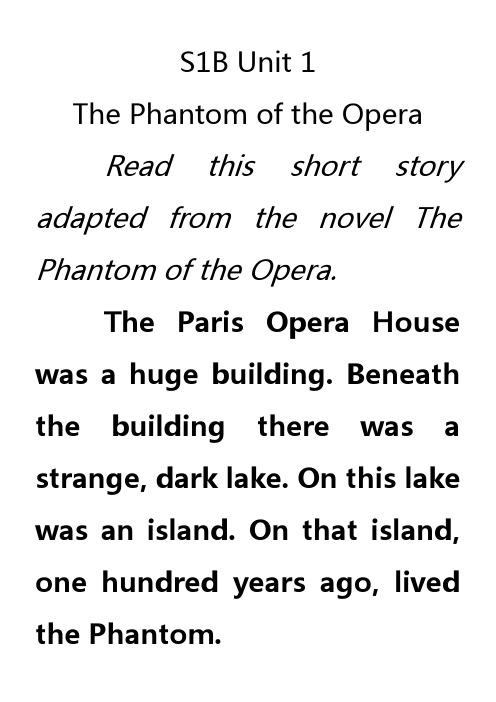
S1B Unit 1The Phantom of the OperaRead this short story adapted from the novel The Phantom of the Opera.The Paris Opera House was a huge building. Beneath the building there was a strange, dark lake. On this lake was an island. On that island, one hundred years ago, lived the Phantom.At birth he was so ugly that his own mother made him wear a mask. She forced him to leave home while he was still a child. He then spent years wandering the Earth until he found his home on the island. Yet, this monster of a man loved singing, and had a wonderful voice.The phantom fell in love with Christine, a beautifulyoung singer at the Opera. He often sang to her late at night, hiding behind a secret wall in her room because he was afraid of letting her see his face. He taught her how to sing and helped her get better roles in the Opera. Christine enjoyed listening to his voice, too.However, the Phantom wanted Christine for himself.He kidnapped her from the stage in front of the whole audience. Then, he took her down to his secret home on the lake. Only one man was brave enough to follow. He was Raoul, a young man who loved Christine. Raoul tried to rescue Christine, but the Phantom captured him and put him in a prison.In the Phantom’s house,Christine pulled off his mask and saw the real man. At first, she was shocked at his horrible face with yellow eyes and no nose, but then she felt sorry about his suffering. She understood how lonely his life had been. She gently kissed his face.No woman had ever touched the Phantom before. Christine’s kiss made him crywith joy. He released Raoul, and told him to take Christine to safety. By now, a group of people had reached the Phantom’s house. They burst in, ready to kill him. At that moment the Phantom disappeared and was never seen again.S1B Unit 1 More reading The Concert Hall which moved Reading this cutting from acity guide for Shanghai to see how one concert hall was kept from destruction.In April 20003, the Shanghai Concert Hall was lifted into the air, and then moved 66.46 meters away.The 5,650-tonne building was deigned and built in 1930 by Chinese architects Zhao Shen and Fan Wenzhao. Originally, the building wasused for showing films. In 1959, it was changed into a concert hall. Some of the world’s top musicians, including the famous cellist Yo-Yo Ma and the violinist Isaac Stern, played there.By 2002, however, the Shanghai Concert Hall faced some difficulties. The building was old and needed repair. Also, an elevated road hadbeen built nearby. The noise of the traffic from the road drowned out the concerts. One way of saving the concert hall was moving it. So, over an eight-day period, workers used machinery to lift the concert hall into the air. They then pushed it along rails to a new location away from the elevated road.The Shanghai ConcertHall was completely restored after being moved. It was also made larger to seat more people. On 1 October 2004 it reopened with a concert by the British Royal Philharmonic Orchestra. With new paint and a new location, the charm of the concert hall was brought back to life.S1B Unit 2Two GeniusesAlbert Einstein was a very famous scientist in the twentieth century. Read this legend about him in a magazine article.Many people regard Albert Einstein (1879-1955) as a genius. His attempt to explain the working of the universe led to the development of nuclear energy.Einstein used to say thatthe only gift he had was curiosity, but this story about him shows that he also had a sense of humour.As a young man with a growing reputation, Einstein received many invitations to go to universities to explain his theories at different universities. On these trips his driver was always the same—a man called Hans. Hans oftensaid to him, 'It's a pleasure to drive a genius like you, Dr Einstein.”One evening, on their way to a distant university, Einstein said 'I wish I didn't have to give my lecture tonight, Hans. I'm so tired, but I don’t want to let my audience down.“You don't need to give the lecture.” said Hans. 'I cangive it for you. I've listened to your lecture so many times that I’ve learnt it by heart. No one knows you at this university, so they won’t find out.”Einstein agreed with Hans, so they changed places. At the university, Hans was guided to a platform, where he stood surrounded by professors and students. Einstein took a seatin the audience, listened to Hans give his lecture perfectly, and joined in the applause at the end.However, before Hans left the platform, a professor shouted from the audience, “I’d like to ask you a difficult question.”He then asked a question so complex that Hans had no idea what he was talking about.Einstein thought, “Oh no! Now we’re in trouble.”But Hans just laughed and said, “That’s not a difficult question. In fact, it’s so easy that even my driver knows how to answer it. Hans, please…”Einstein stood up and answered the question perfectly.They left the university,with Einstein driving. A little later, Hans offered to drive. “No, my friend,”said Einstein. “It’s a pleasure to drive a genius like you, Hans.”S1B Unit 2 More readingThe Nobel PrizeRead this leaflet about the Noble Prize.Alfred Nobel was an inventor born in Sweden. When he died in 1896, he left alot of money and property. This was then worth about nine million US dollars, and later became the original source of the world-famous Nobel Prize.Nobel believed that the spread of knowledge would make the world a better place. The yearly-awarded prizes are given to honour those who help mankind. Nobel said thatthe prizes should honour ‘the most important discoveries or inventions’ in physics, chemistry, physiology or medicine and ‘the most outstanding works’ in literature.Since 1901. the Nobel Prize has been presented to the winners on 10 December, the anniversary of Alfred Nobel’s death. At the awardceremony in the Stockholm Concert Hall, the king of Sweden hands each winner a diploma and a medal. The ceremony is followed by a large banquet for about 1,300 people Among the guests of honour are the Nobel Prize winners and their families, the King and the Queen, and many well-known leaders in science and culture. Two hundred andfifty young students are also honoured with invitations to this grand occasion.S1B Unit 3The interesting world ofplantsPlants can be much more interesting than you think. Read this transcript from a nature film to find out why.Water lilies can often be seen in China, with their roundleaves, or pads, floating in ponds. In Hangzhou, there is a kind of water lily whose pads are so huge that a person can stand on them. This is a Victoria lily, the largest kind of water lily in the world. Its pads are more than two meters wide and its white or purple flowers can grow as large as 45 centimeters across.Some flowering plantscan also be eaten. The lotus, a near relative of the water lily, is such a plant. It has a long white root, in which there are many holes. In Asian countries, lotus roots and seeds are often cooked and served in meals. In the West, eating lotus roots or seeds is not as popular as it is in Asia.The banyan tree is an interesting tree with manyroots growing down from its branches. It can be found in South China and other parts of Asia. When its roots reach the ground, they plant themselves and grow bark. Eventually they either become part of the original tree trunk or become separate tree trunks. Using this method, banyan trees can cover an enormous area. The world's largest banyan tree, inIndia, covers an area larger than a football pitch. Even though it is only one tree, it looks like a whole forest!Speaking of trees, a gingko tree believed to be around 2800 years old was recently discovered in Hebei Province, China. Many gingko trees have been around for more than 1000 years---that is the reason why they areknown as 'longevity trees' in China. While gingko trees can live for a long time, they are not even near being the oldest trees. Bristlecone pine trees in America are among the oldest living trees. One bristlecone pine tree in Nevada is over 4600 years Old!S1B Unit 3 More readingLearn to care for plantsRead this article from anewspaper to get some new ideas about what plants you can grow this year.Spring is in the air, so it is time to go outside and do some gardening. Here are three plants which can decorate your home.Why not grow common white jasmine/ You can raise it as either a bush or a vine. Jasmine vines produce moreflowers than jasmine bushes, but they need a frame to grow on. If you grow them on a frame over a path, the path will soon have a cover of whit, sweet-smelling flowers. Jasmine is not just for tea.Of course, if you like blossoms, do not ignore the Yulan magnolia. These trees can grow to be over 12 meters tall. In early spring, they arecovered with white blossoms which are more than 12 centimeters wide. After the blossoms fall off, green leaves cover the trees all summer. In autumn, these leaves change to red and orange before they litter the ground with color. The Yulan magnolia is ideal for cool, moist climates.If you have no idea what to grow, you could plant agolden ball cactus. You could keep it in your house, or plant it outside where it can grow to be more than 60 centimeters tall. While it prefers the sun, it tolerates temperatures of below zero degrees centigrade.Unit 4Friend or Enemy? Read the excerpt from the play Winston and the Spider to learnabout one kind of small creature. The scene begins with Winston and his wife Betty standing in their kitchen.Betty: (jumping in fright, and then shouting) Kill it! Winston: (calmly) Certainly not.Betty: Why? You're not frightened of it, Winston, are you? It's only an insect. Winston: It isn't an insect,Betty. It’s a spider.Actually, spiders arevery usefulcreatures. I watcheda TV programmelast night thatcompletely changedmy views aboutspiders. Do youwant to hear aboutit?Betty: Not really, (Shesighs.) but I suppose you're going to tell me anyway. Winston: Spiders are theenemies of insectsand the friends ofhumans. Chinesefarmers realizedthat years ago. Doyou know that inparts of China, inautumn, farmersbuild shelters forspiders and putthem all over theirfields?Betty: No, I didn’t knowthat.Winston: (ignoring herremarks) Theshelters are like littletents. Survivingwinter in them, thespiders emergehealthy and hungrywhen spring comes. At the same time, millions of insects arrive to attack the farmers' crops. The spiders fill their empty stomachs, and the farmers become happy because their fields have been protected.Betty: So everyone'shappy except theinsects.Winston: Right, and nowthis natural methodof pest control isbeing copied allover the world. Betty: (looking bored) Interesting, but now I must go and...Winston: (becoming excited)Wait! There's more.What’s strongerthan steel, lighterthan a feather andas elastic as a rubberband?Betty: What? Winston: It's the silk thatspiders make theirwebs with.Scientists are tryingto develop amaterial havingsimilar properties.They plan to use it inspacecraft, artificialorgans like hearts,and to make reallybullet-proof vests. Betty: I still think spidersare nasty andshould be killed.Their bites arepoisonous, aren'tthey?Winston: To insects, yes, butto people, rarely.But even theirpoison is useful.Doctors think itmight be used totreat brain disordersin humans.' Betty: That's good newsfor you, then. (shelaughs)Butseriously, I get yourpoint, Winston. Weshould try tounderstand thingsin nature and notdestroy them.'S1B Unit 4 More ReadingThe mystery of hibernationNo human has experienced hibernation, and yet many creatures experience it every year. Read the followingarticle from a science magazine to see what hibernation is all about.What do bears, bats and frogs have in common? They all hibernate. Hibernation is a state often compared to sleep. It often occurs in winter, when a creature does not move for weeks or months continuously. Creatures hibernate to survive the cold weather and theabsence of food.A typical example of a hibernating creature is the bat. When winter comes, bats find a safe place in a cave. Looking like they a dead, they hang upside down. Their pulse and breathing rates greatly slow down. Their body temperatures drop as well. These things help them save energy during long winterswhen it is difficult to find food.Frogs, like many amphibians, also hibernate when it gets cold. After digging deep into the mud at the bottom of a pond, they do not stir again until it is warm. During hibernation, they breathe through their skins, not their mouths.Another hibernatingcreature is the bear. In contrast to other creatures, hibernating bears do not appear as though they are dead, but seem as though they are very sleepy. If they are disturbed during hibernation, they can get up very quickly. While hibernating, bears stay in their dens, which are filled with leaves to make their stay more comfortable and warmer. Inspring, having awakened, they leave their dens, thin and hungry.S1B Unit 5What should I do? Letters from students asking for advice are published anonymously in a school newspaper as a part of the “counselor’s corner.”Read excerpts from the letters below. 1One evening last month, I was visiting a close friend in her new high-rise flat when she accidentally knocked a flower pot from her window. It smashed to the ground below, narrowly missing some children at play. On our way out, we stopped to take a look, but no one was hurt, so we said nothing and left for the cinema as planned.Returning home later that evening, my friend learned that the police had been to the flats and questioned everyone. They had even taken a neighbor’s son to the police station. After questioning him, they let him go temporarily. Frightened, my friend has said nothing to the police.Though no one was hurt,I have a guilty conscience and ...2Last night, while traveling home on the ground, I saw three tough guys enter my almost empty carriage.They sat down beside a young boy who was travelling alone and began to tease and bully him. Their behavior was so bad that it made him moveto another seat, but that did no good. They just followed him and continued their bullying. The boy was obviously frightened. At this point, I stopped looking and got off at my station, feeling sorry for the boy. I regret not helping him, but not being Superman and hating violence, what could I do? Should I...3The checkout assistant at my usual supermarket is always rude and unhelpful. A few days ago, I gave her a fifty pound note to pay for a six-pound purchase, but she was so busy grumbling that she accidentally gave me an extra ten-pound note in my change.On discovering the error, I went back and tried to tell her.。
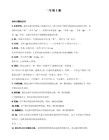
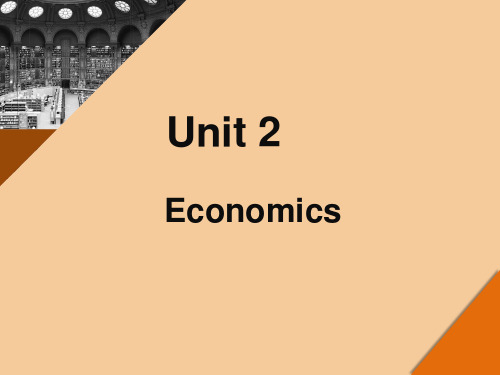
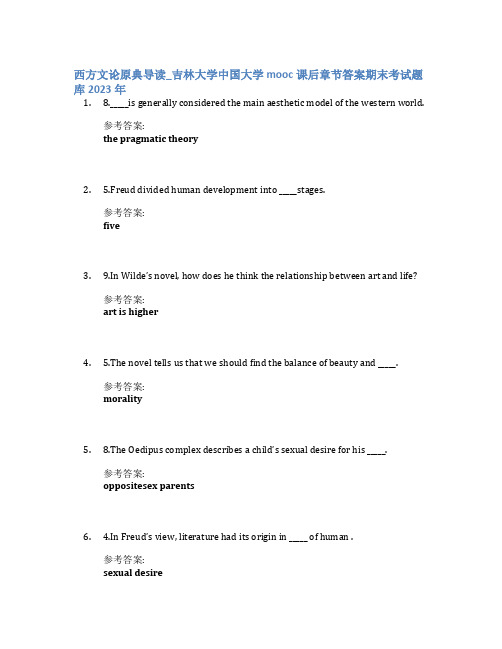
西方文论原典导读_吉林大学中国大学mooc课后章节答案期末考试题库2023年1.8._____is generally considered the main aesthetic model of the western world.参考答案:the pragmatic theory2. 5.Freud divided human development into _____stages.参考答案:five3.9.In Wilde’s novel, how does he think the relationship between art and life?参考答案:art is higher4. 5.The novel tells us that we should find the balance of beauty and _____.参考答案:morality5.8.The Oedipus complex describes a child’s sexual desire for his _____.参考答案:oppositesex parents6. 4.In Freud’s view, literature had its origin in _____ of human .参考答案:sexual desire7. 2.Freud called a force can promote Ego to transform into other forms as_____.参考答案:libido8. 3.Freud mainly analyzes through _____ and talks about human mind.参考答案:scientific pattern9. 1.In what year that Wordsworth published his Preface to Lyrical Ballads.参考答案:180010. 3. In the Mirror and the lamp, Wordsworth is concluded as a representativeof _____ theories.参考答案:expressive11.10.In Aristotle’s view, the core of art is _____.参考答案:imitation12. 2.Which drama is created by Oscar Wilde?参考答案:Salome13. 1.In Aristotle’s words, who is more to the truth than historian?参考答案:poet14.9.Until Aristotle, the concept of _____ has been adressed explicitly.参考答案:system15.8.Wilde’s last work is _____.参考答案:The ballad of reading caol16. 4.The novel we learned in this class presents Wilder’s views of _____.参考答案:aestheticism17. 3.Oscar Wilde is called “Prince of _____”.参考答案:Fairytales18. 1.Freud provided a new research method, what is it?参考答案:psycho-analysis19. 5.From the aspect of words, it emphasized words____.参考答案:classical20.8.Aristotle’s Poetics mainly discussed about _____ and epic.参考答案:tragedy21. 5.In comparison with Plato, the biggest character of Aristotle is_____.参考答案:comprehensiveness22.10.Which theory concluded those objective perspectives in western literartheory well.参考答案:the mimetic theory23.9.The expressive theory stresses the effect of _____.参考答案:poet’s mind24. 5.Abrams thinks that post-renaissance critics is primarily oriented,not fromwork to universe,but from work to _____.参考答案:audience25. 2.In Abrams’s words, the relationship of art works and universe wasconcluded as the _____theory.参考答案:mimetic26. 6.Which book is the representative work of english romantic movement?参考答案:Lyrical Ballads(1798)27.8.Which work was published by Wordsworth’s widow after his death.参考答案:The prelude28.10.In the novel, Dorian Gray’s life can be summarized as _____.参考答案:double life29. 1.In the Mirror and the Lamp, Abrams put forward the four factors ofliterture: universe, _____, artist and audience.参考答案:works30. 3.Abrams is a famous literary critic for _____ literature.参考答案:romantic31. 6.Who is called as “the father of psychoanolysis” _____.参考答案:Freud32. 4.Aristotle’s poetics was valued in the history of western literary criticismfrom _____century inFrance.参考答案:16th33. 2. Aristotle thinks types differ from one another in three ways: the means,objects and _____.参考答案:manner34.10.In the class about libido, Freud talked _____tiers in people’s mind.参考答案:three35.9.According to the example we talked about interpretation of dreams, whichanimal be used to suggest sexual repression.参考答案:snake36.7.Does Freud believe that a person’s development is determined by geneticfactors.参考答案:no37. 1.In the class, the preface we read is written for which book?参考答案:The picture of Dorian Gray38. 2.Wordsworth, Coleridge and Southey are called _____.参考答案:lake poets39. 6.Wilde produced _____ social comedies in the early 1890s.参考答案:four40.7.Which work is written by Wilde in prison?参考答案:De profundis41.10.Howdoes Wordsworth think about the relationship between Poeticlanguage and Proselanguage?参考答案:no essential difference42.7.Wordsworth’s philosophical views almost all come from _____.参考答案:the apocalypse of nature43. 4.Wordsworth gained his reputation among chinese scholars by “Poetry isthe nature explession of _____”.参考答案:strong emotions44. 6._____ is called a Encyclopedia of character in Greek.参考答案:Aristotle45. 3.In the poetics, _____ is the goal of the tragedy.参考答案:plot46.7.The classical model of rhetoric to discuss poetry was ____.参考答案:Horace47. 6.In the pragmatic theory,poetry’s affects in audiences only as a means end of_.参考答案:teaching48. 4.The Mimetic theory first appeared in _____.参考答案:Plato’s di alogue49.7.Aristotle set up his own schools called _____.参考答案:lyceum。
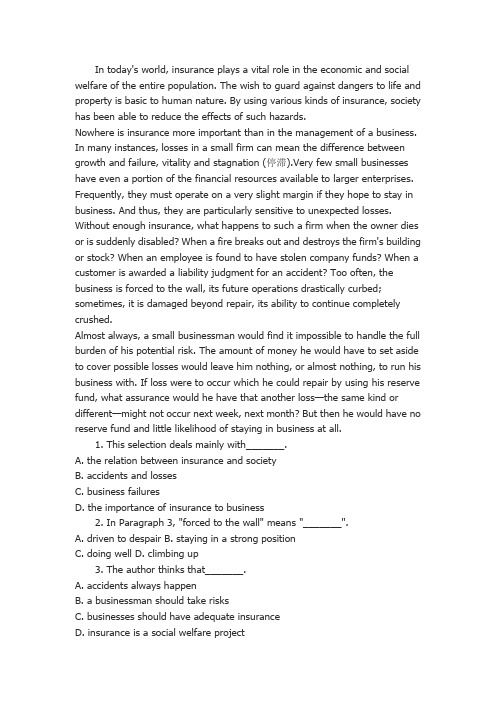
In today's world, insurance plays a vital role in the economic and social welfare of the entire population. The wish to guard against dangers to life and property is basic to human nature. By using various kinds of insurance, society has been able to reduce the effects of such hazards.Nowhere is insurance more important than in the management of a business. In many instances, losses in a small firm can mean the difference between growth and failure, vitality and stagnation (停滞).Very few small businesses have even a portion of the financial resources available to larger enterprises. Frequently, they must operate on a very slight margin if they hope to stay in business. And thus, they are particularly sensitive to unexpected losses. Without enough insurance, what happens to such a firm when the owner dies or is suddenly disabled? When a fire breaks out and destroys the firm's building or stock? When an employee is found to have stolen company funds? When a customer is awarded a liability judgment for an accident? Too often, the business is forced to the wall, its future operations drastically curbed; sometimes, it is damaged beyond repair, its ability to continue completely crushed.Almost always, a small businessman would find it impossible to handle the full burden of his potential risk. The amount of money he would have to set aside to cover possible losses would leave him nothing, or almost nothing, to run his business with. If loss were to occur which he could repair by using his reserve fund, what assurance would he have that another loss—the same kind or different—might not occur next week, next month? But then he would have no reserve fund and little likelihood of staying in business at all.1. This selection deals mainly with_______.A. the relation between insurance and societyB. accidents and lossesC. business failuresD. the importance of insurance to business2. In Paragraph 3, "forced to the wall" means "_______".A. driven to despairB. staying in a strong positionC. doing wellD. climbing up3. The author thinks that_______.A. accidents always happenB. a businessman should take risksC. businesses should have adequate insuranceD. insurance is a social welfare project4. Adequate insurance will do all of the following EXCEPT that itwill_______.A. free some business fundsB. add to benefits for employeesC. relieve some management problemsD. provide for unexpected incidents5. The word "curbed" in Paragraph 3 is nearest in meaning to_______.A. checkedB. advancedC. expandedD. disturbed答案:1. D2. A3. C4. B5. AThe difference between a liquid and a gas is obvious under the conditions of temperature and pressure commonly found at the surface of the Earth. A liquid can be kept in an open container and fill it to the level of a free surface. A gas forms no free surface but tends to diffuse throughout the__1__available; it must therefore be kept in a closed container or held by a gravitational field, as in the__2__of a planet's atmosphere. The distinction was a __3__feature of early theories describing the phases of matter. In the nineteenth century, for example, one theory maintained that a liquid could be "dissolved" in a vapor without losing its identity, and another theory__4 __that the two phases are made up of different kinds of molecules. The theories now prevailing take a quite different approach by emphasizing what liquids and gases have in __5 __They are both forms of matter that have no __6 __structure, and they both flow readily.The fundamental similarity of liquids and gases becomes clearly apparent when the temperature and pressure are __7__somewhat. Suppose a closed container __8__filled with a liquid is heated. The liquid expands, or in other words becomes less dense; some of it evaporates. In contrast, the vapor above the liquid surface becomes denser as the evaporated molecules are __9__to it. The combination of temperature and pressure at which the densities become __10__is called the critical point.A. addedB. caseC. prominentD. heldE. equalF. partiallyG. exampleH. previousI. space J, lifted K. permanent L. particularlyM. extended N. raised O. common答案:I. I 2. B 3. C 4. D 5. O 6. K 7. N 8. F 9. A 10. EPlastics are materials which are softened by heatand set into lasting form when shaped in a mold. Someare natural; some are semi-synthetic(半合成的) , theresult of chemical action on natural substance; someare synthetic, bu ilt up from the constituents of oil orcoal. All are based on the chemistry of car bon, with itscapacity for forming chains. The molecules thatcompose them (m onomers) link together in the settingor curing(硫化) process to form chains (polymers) , which give plastics their flexiblestreng th. Some plastics retain their ability to be softened and reshaped; like wax,the y are thermoplastic. Others set permanently in the shapes they are given by h eatand pressure; like eggs, they are thermosetting.From industrial beginnings in the nineteenth century, plastics have struggled t hrougha hundred and twenty years of glory, failure, disrepute and suspicion o n the slowroad to public acceptance. Now, at last, one can positively say that plastics areappreciated and enjoyed for what they are; that they make moder n life richer, morecomfortable and convenient, and also more fun. Plastics are warm materials,sympathetic to the human touch, and their transformation int o things that come intocontact with human beings is entirely appropriate. The fact that there are plastic antiques comes as a shock to most people. Ho w can amaterial that seems so essentially twentieth century, and one that is s o muchassociated with cheap, disposable products, has a history at all? It is a youngtechnology, and a great part of the fun of collecting plastics is that bea utiful pieces ofhistorical interest can still be found very cheaply.1. The word "sympathetic" in Paragraph 2 most probably means_______.A. harmfulB. agreeableC. pitifulD. sorry2. It can be concluded from this passage that_______.A. plastics are synthetic materialsB. plastics won public acceptance 120 years agoC. plastics are very harmful in modern lifeD. plastics are cheap as antiques3. Which of the following is essential to create any type of plastics?A. Carbon.B. Eggs.C. Oil.D. Coal.4. Plastics that harden into permanent shapes are called_______.A. chainedB. thermoplasticC. syntheticD. thermosetting5. Which of the following is the best title for the passage?A. The Importance of Plastics in the Nineteenth Century.B. Why People Are Suspicious of Plastics.C. The Development of Plastics as a Modern Material.D. How Plastics Are Manufactured.答案1. B2. D3. A4. D5. CLaziness is a sin(罪), everyone knows that. Wehave probably all had lectu res pointing out that lazinessis immoral, that it is wasteful, and that lazy peopl e willnever amount to anything in life. But laziness can bemore harmful than t hat, and it is often caused by morecomplex reasons rather than simple wish t o avoidwork. Some people who appear to be lazy are sufferingfrom much mor e serious problems. They may be sodistrustful of their fellow workers that the y are unable to join in any group task forfear of ridicule or of having their idea stolen. These people who seem lazy may beruined by a fear of failure that pr events fruitful work. Or other sorts of fantasies (幻想) may prevent work; some people are so busy planning, sometimes plannin g greatdeals of fantastic achievements that they are unable to deal with what ever "lesser"work is on hand. Still other people are not avoiding work; strictly speaking, they aremerely procrastinating rescheduling their day.Laziness can actually be helpful. Like procrastinators, some people may look l azywhen they are really thinking, planning, researching. We should all remem ber thatgreat scientific discoveries occurred by chance. Newton wasn't workin g in the orchardwhen the apple hit him and he devised the theory of gravity. All of us would like tohave someone "lazy" build the car or stove we buy, parti cularly if that "laziness" werecaused by the worker's taking time tocheck each step of his work and to do his job right. And sometimes, being"laz y"—that is,, taking time off for a rest—is good for the overworked students or executives. Taking a rest can be particularly helpful to the athlete who is tryin g toohard or the doctor who's simply working himself overtime too many even ings at theclinic. So be careful when you're tempted to call someone lazy. Tha t person may bethinking, resting, or planning his or her next work.1. The main idea of this passage is that_______.A. laziness is a moral sinB. there are advantages and disadvantages in being lazyC. laziness is the sign of deep-seated emotion problemsD. lazy people do more careful work2. The passage states that_______.A. laziness is a diseaseB. laziness is more beneficial than harmfulC. a good definition of laziness is emotional illnessD. some people appear lazy because they are insecure3. Which of the following conclusions does the passage support?A. Most of the time laziness is a virtue.B. Most assembly workers are lazy.C. The word laziness is sometimes applied incorrectly.D. Most insecure people are lazy.4. As used in this passage, the word "devised"(Para. 2) means_______.A. understoodB. wroteC. madeD. proved5. Being lazy may be good for_______.A. doctorsB. athletesC. executivesD. those who overwork themselves答案:1. B2. D3. C4. C5. D1. This is yet _________________ (两国人民的又一个共同点).2. His scientific works _______________(在英语国家得到广泛阅读).3. Revolution means the emancipation of the productiveforces,_____________(改革也是解放生产力).4.He is optimistic ________________(对现时信息产业的发展状况).5.Work in all fields should be subordinated to and ________________(服务于经济发展的进程).答案解析:1. another common point between the people of our two countries解析:本题考查通过增补介词使译文的意思更完整。
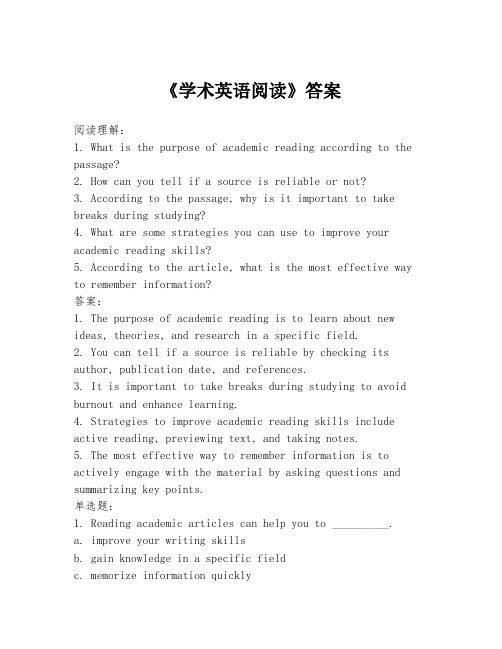
《学术英语阅读》答案阅读理解:1. What is the purpose of academic reading according to the passage?2. How can you tell if a source is reliable or not?3. According to the passage, why is it important to take breaks during studying?4. What are some strategies you can use to improve your academic reading skills?5. According to the article, what is the most effective way to remember information?答案:1. The purpose of academic reading is to learn about new ideas, theories, and research in a specific field.2. You can tell if a source is reliable by checking its author, publication date, and references.3. It is important to take breaks during studying to avoid burnout and enhance learning.4. Strategies to improve academic reading skills include active reading, previewing text, and taking notes.5. The most effective way to remember information is to actively engage with the material by asking questions and summarizing key points.单选题:1. Reading academic articles can help you to __________.a. improve your writing skillsb. gain knowledge in a specific fieldc. memorize information quickly2. Which of the following is NOT a reliable source for academic research?a. An article published in a reputable academic journalb. A personal blog written by someone with expertise in a specific fieldc. A book written by a well-known scholar3. According to the passage, what is an effective way to reduce distractibility while studying?a. Listening to musicb. Turning off your phonec. Drinking coffee4. Which of the following is an example of active reading?a. Skimming a text quicklyb. Highlighting important informationc. Reading while watching TV5. Previewing a text before reading involves __________.a. reading the entire text from start to finishb. looking for key words and phrasesc. summarizing the main points答案:1. B2. B3. B4. B5. B完形填空:When it comes to academic reading, there are many __1__ you can use to improve your skills. One of the most effective strategies is active reading, which __2__ engaging with the text by asking questions, summarizing key points, and making connections to your own experiences. __3__, previewing a textbefore reading can help you to gain an __4__ of what it is about, which can make the actual reading process easier. Another strategy for improving your academic reading skillsis to take __5__ while you read. This can involve underlining important information, making notes in the margins, or __6__ a summary of the key points after each section. If you __7__ new vocabulary or concepts, it may be helpful to look them up __8__ and make note of their definitions.Finally, it is important to __9__ breaks while studying to avoid burnout and enhance learning. Research has shown that taking short breaks every hour or so can __10__ your productivity and focus.1. a. strategies2. b. involves3. c. Additionally4. a. understanding5. d. notes6. b. writing7. c. encounter8. b. immediately9. d. take10. a. increase答案:1. A2. B3. C4. A5. D6. B7. C8. B9. D10. A听力理解:1. What is the topic of the lecture?2. According to the professor, what are some effective strategies for improving academic reading skills?3. According to the speaker, what are some characteristics ofa reliable source for academic research?4. What does the professor recommend for reducing distractibility while studying?5. What is the main conclusion of the lecture?答案:1. Strategies for improving academic reading skills.2. Active reading, previewing text, and taking notes.3. A reliable source for academic research should be written by experts in the field and be recent and reputable.4. Turning off your phone or finding a quiet place to study can reduce distractibility.5. The main conclusion of the lecture is that by applying different strategies for academic reading, students will be able to improve their ability to gain knowledge in a specific field.作文:请写一篇作文,提供至少三种你所使用的有效的英语阅读策略,并举例说明如何使用他们来改善你的阅读技能。
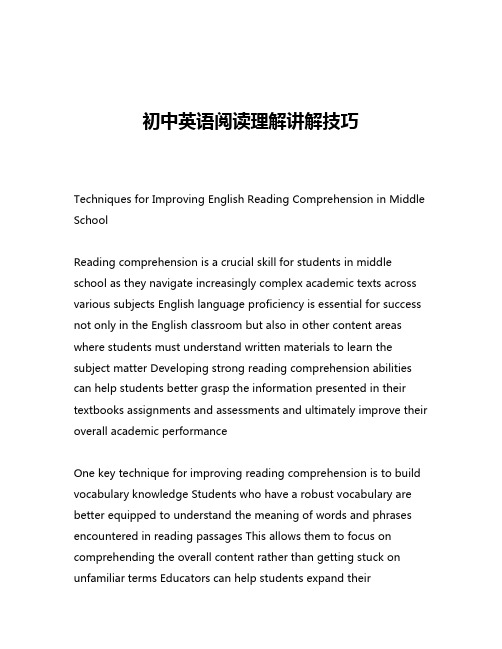
初中英语阅读理解讲解技巧Techniques for Improving English Reading Comprehension in Middle SchoolReading comprehension is a crucial skill for students in middle school as they navigate increasingly complex academic texts across various subjects English language proficiency is essential for success not only in the English classroom but also in other content areas where students must understand written materials to learn the subject matter Developing strong reading comprehension abilities can help students better grasp the information presented in their textbooks assignments and assessments and ultimately improve their overall academic performanceOne key technique for improving reading comprehension is to build vocabulary knowledge Students who have a robust vocabulary are better equipped to understand the meaning of words and phrases encountered in reading passages This allows them to focus on comprehending the overall content rather than getting stuck on unfamiliar terms Educators can help students expand theirvocabulary through explicit instruction of high frequency academic words as well as strategies for inferring the meanings of unknown words from context clues such as surrounding sentences and paragraphsAnother important technique is to teach students how to actively engage with a text before during and after reading This metacognitive approach encourages students to be thoughtful and purposeful in their reading rather than passively absorbing information Active reading strategies include previewing the text to identify the main idea and key points making predictions about the content based on the title and other textual features generating questions they hope to answer while reading and summarizing the key information after finishing the passage These practices help students monitor their understanding stay focused and draw meaningful connections throughout the reading processExplicitly teaching text structures and organizational patterns can also enhance reading comprehension Middle school students benefit from learning about common text structures such as cause and effect compare and contrast problem solution and chronological order Recognizing these patterns allows students to anticipate the flow of information in a passage and focus their attention on identifying the relationships between ideas This knowledge can then be applied across different subject areas and text typesIn addition to building vocabulary and teaching active reading strategies and text structures educators should provide students with opportunities to practice reading comprehension through a variety of engaging texts Middle school is a critical time when students transition from learning to read to reading to learn Exposing them to an array of fiction and nonfiction materials on topics that are relevant and interesting to them can help sustain their motivation and engagement with the reading process Incorporating both challenging and accessible texts can also differentiate instruction to meet the diverse needs of students at varying reading levelsFormative assessments are another essential component of improving reading comprehension in middle school Regularly checking for understanding through quizzes discussions and other informal assessments allows teachers to identify areas where students are struggling and adjust their instruction accordingly This could involve reteaching key concepts clarifying confusing points or providing additional practice with specific comprehension skills Timely feedback and opportunities for revision also empower students to take an active role in monitoring and improving their own reading abilitiesFinally fostering a classroom environment that values reading and celebrates progress can go a long way in cultivating a love of readingamong middle school students Teachers can model enthusiasm for reading share their own reading experiences and interests and provide incentives and recognition for students who demonstrate growth in their reading skills Creating a community of readers encourages students to see reading not just as a requirement but as a rewarding lifelong skillIn conclusion developing strong reading comprehension abilities is vital for middle school students academic success and future endeavors Educators can employ a variety of techniques to support this development including building vocabulary teaching active reading strategies and text structures providing engaging reading materials conducting formative assessments and fostering a positive reading culture in the classroom By implementing these strategies teachers can empower their students to become confident and capable readers prepared to tackle the increasingly complex texts they will encounter throughout their educational journeys。
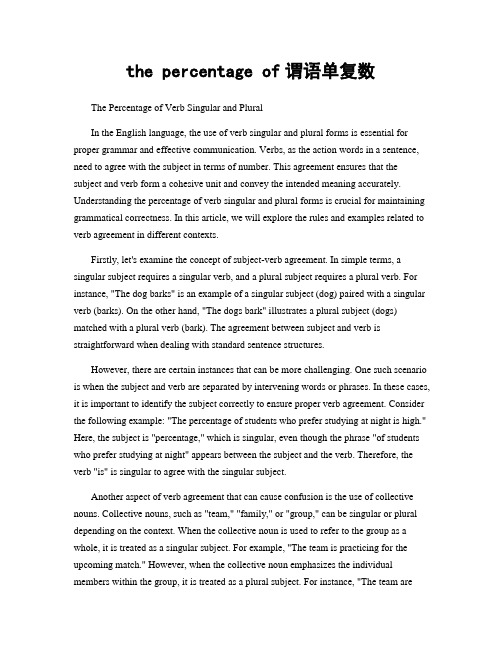
the percentage of谓语单复数The Percentage of Verb Singular and PluralIn the English language, the use of verb singular and plural forms is essential for proper grammar and effective communication. Verbs, as the action words in a sentence, need to agree with the subject in terms of number. This agreement ensures that the subject and verb form a cohesive unit and convey the intended meaning accurately. Understanding the percentage of verb singular and plural forms is crucial for maintaining grammatical correctness. In this article, we will explore the rules and examples related to verb agreement in different contexts.Firstly, let's examine the concept of subject-verb agreement. In simple terms, a singular subject requires a singular verb, and a plural subject requires a plural verb. For instance, "The dog barks" is an example of a singular subject (dog) paired with a singular verb (barks). On the other hand, "The dogs bark" illustrates a plural subject (dogs) matched with a plural verb (bark). The agreement between subject and verb is straightforward when dealing with standard sentence structures.However, there are certain instances that can be more challenging. One such scenario is when the subject and verb are separated by intervening words or phrases. In these cases, it is important to identify the subject correctly to ensure proper verb agreement. Consider the following example: "The percentage of students who prefer studying at night is high." Here, the subject is "percentage," which is singular, even though the phrase "of students who prefer studying at night" appears between the subject and the verb. Therefore, the verb "is" is singular to agree with the singular subject.Another aspect of verb agreement that can cause confusion is the use of collective nouns. Collective nouns, such as "team," "family," or "group," can be singular or plural depending on the context. When the collective noun is used to refer to the group as a whole, it is treated as a singular subject. For example, "The team is practicing for the upcoming match." However, when the collective noun emphasizes the individual members within the group, it is treated as a plural subject. For instance, "The team arewearing their uniforms proudly." In this sentence, the plural verb "are" agrees with the plural subject "team" because the focus is on the individual members.Furthermore, the use of indefinite pronouns can also influence verb agreement. Indefinite pronouns, such as "everyone," "someone," or "anyone," are singular and require singular verbs. For instance, "Everyone loves ice cream." However, there are exceptions with indefinite pronouns that can be either singular or plural depending on the intended meaning. For example, "Some of the cake is missing" indicates a singular verb agreement because the focus is on the cake as a whole. Conversely, "Some of the children are playing outside" suggests a plural verb agreement because the emphasis is on the individual children.Additionally, the concept of percentages itself can affect verb agreement. When the percentage is followed by a singular noun, the verb should be singular. For example, "The percentage of the population that speaks English as a second language is increasing." However, when the percentage is followed by a plural noun, the verb should be plural. For instance, "The percentages of the students who passed the exam vary from class to class." In this case, the plural verb "vary" agrees with the plural noun "percentages."In conclusion, understanding the percentage of verb singular and plural forms is crucial for maintaining proper grammar in the English language. By ensuring the subject and verb agree in terms of number, sentences convey accurate meaning and enhance effective communication. Whether dealing with intervening words, collective nouns, indefinite pronouns, or the concept of percentages, following the appropriate rules of verb agreement is essential. By adhering to these rules, we can improve our writing and speaking skills, allowing for clearer and more coherent communication.。
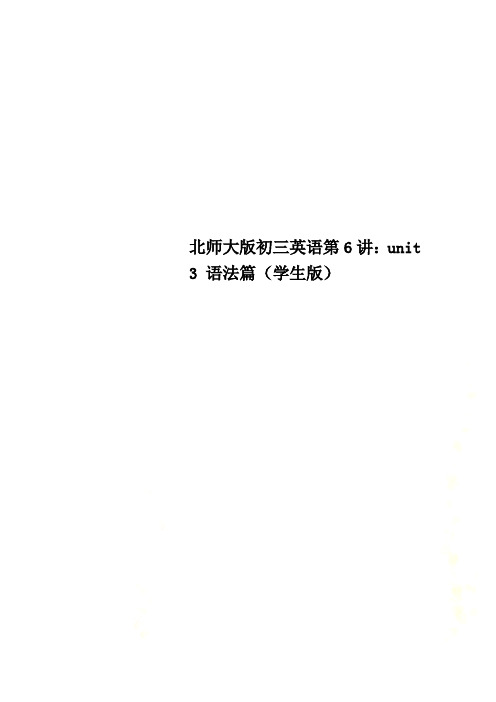
北师大版初三英语第6讲:unit 3 语法篇(学生版)Unit 3语法篇____________________________________________ __________________________________________________________________________________ ______________________________________理解并掌握常见连词及表示原因连词的用法1. 常见连词(and, but, or, so)的用法(1) and“和,而且,又”,表示并列关系。
例如:I woke up and got out of bed. 我醒了就起床了。
(2) but“但是”表示转折关系。
例如:I got up early but I still missed the first bus.我起得很早,但仍然错过了早班车。
(3) or“或者;否则”。
例如:Hurry up, or you will be late. 快点儿,否则你就要迟到了。
(4) so“所以”,表示因果关系。
例如:I heard some noise outside, so I went out ofSince everybody is here, let’s begin. 既然大家都在这里,我们开始吧。
(3) as是常用词,它表示的原因是双方已知的事实或显而易见的原因,或者理由不是很重要;比since语气弱,没有since正式,常译为“由于,鉴于”。
从句说明原因,主句说明结果,主从句并重。
例如:As I was not ready, they went without me.由于我没有准备好,他们没有带我去。
(4) for表明附加或推断的理由,其后的分句不能放句首,语气最弱。
例如:It mush have rained last night, for the ground is wet.昨晚一定下了雨,因为地面是湿的。
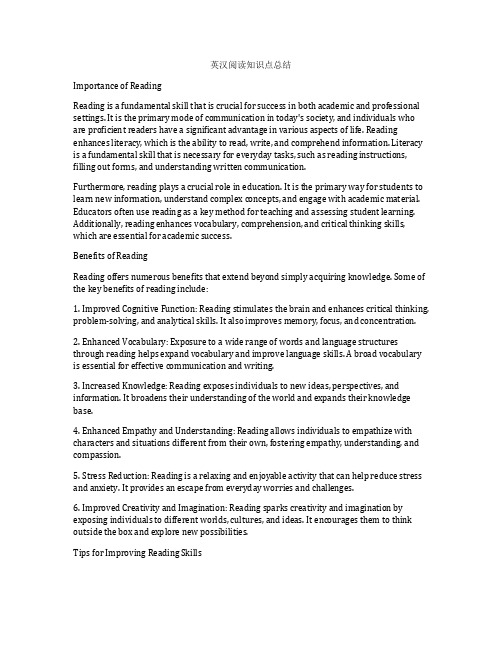
英汉阅读知识点总结Importance of ReadingReading is a fundamental skill that is crucial for success in both academic and professional settings. It is the primary mode of communication in today's society, and individuals who are proficient readers have a significant advantage in various aspects of life. Reading enhances literacy, which is the ability to read, write, and comprehend information. Literacy is a fundamental skill that is necessary for everyday tasks, such as reading instructions, filling out forms, and understanding written communication.Furthermore, reading plays a crucial role in education. It is the primary way for students to learn new information, understand complex concepts, and engage with academic material. Educators often use reading as a key method for teaching and assessing student learning. Additionally, reading enhances vocabulary, comprehension, and critical thinking skills, which are essential for academic success.Benefits of ReadingReading offers numerous benefits that extend beyond simply acquiring knowledge. Some of the key benefits of reading include:1. Improved Cognitive Function: Reading stimulates the brain and enhances critical thinking, problem-solving, and analytical skills. It also improves memory, focus, and concentration.2. Enhanced Vocabulary: Exposure to a wide range of words and language structures through reading helps expand vocabulary and improve language skills. A broad vocabulary is essential for effective communication and writing.3. Increased Knowledge: Reading exposes individuals to new ideas, perspectives, and information. It broadens their understanding of the world and expands their knowledge base.4. Enhanced Empathy and Understanding: Reading allows individuals to empathize with characters and situations different from their own, fostering empathy, understanding, and compassion.5. Stress Reduction: Reading is a relaxing and enjoyable activity that can help reduce stress and anxiety. It provides an escape from everyday worries and challenges.6. Improved Creativity and Imagination: Reading sparks creativity and imagination by exposing individuals to different worlds, cultures, and ideas. It encourages them to think outside the box and explore new possibilities.Tips for Improving Reading SkillsWhile reading is a natural skill, it can be improved with practice and dedication. Here are some tips for enhancing reading skills:1. Set Aside Time for Reading: Schedule regular time for reading each day. Whether it's in the morning, during lunch, or before bed, setting aside dedicated time for reading can help develop a consistent reading habit.2. Choose Reading Material Wisely: Select reading materials that are interesting and engaging. Whether it's fiction, non-fiction, magazines, or articles, choose material that piques your curiosity and keeps you motivated.3. Read Actively: Engage with the material actively by asking questions, making connections, and reflecting on the content. Actively reading improves comprehension and retention of information.4. Build Vocabulary: Keep a dictionary handy while reading to look up unfamiliar words. Building vocabulary enhances language skills and comprehension.5. Practice Different Types of Reading: Read different genres and types of material, such as fiction, non-fiction, poetry, and articles, to broaden your understanding and perspective.6. Join a Book Club or Reading Group: Joining a book club or reading group provides an opportunity to discuss and engage with others about reading material, fostering a deeper understanding and appreciation for the content.In summary, reading is a fundamental skill that offers numerous benefits and enriches individuals' lives. It is essential for academic success, professional development, and personal growth. By actively engaging with reading material, individuals can improve their cognitive function, enhance their vocabulary, and broaden their understanding of the world. With dedication and practice, individuals can improve their reading skills and enjoy the many benefits that reading has to offer.。
Theories of Reading and the Teaching of English ReadingCHEN Chun-mei(Cunjin College,Guangdong Ocean University,Zhanjiang524000,China)Abstract:English reading has gained much attention among teachers and students and become one of the research heatpots in English peda⁃gogy.The paper gives a brief introduction of the theories of reading and attempts to apply the schema theory of reading into the classroom teaching.The classroom practice reveals that English reading under the guidance of schema theory proves effective and raises students' awareness of strategies.Key words:the"bottom-up"view;the"top-down"view;the"interractive"view;the"schemata-theoretic"view;reading strategies; English reading;English teaching中图分类号:H319文献标识码:A文章编号:1009-5039(2012)01-0112-03English reading has been in a long time regarded as one of the most significant skills in English teaching and reading.It has be⁃come increasingly important as the the globalization is accelerating, the weight of English reading in the English proficiency tests has been increased,say,CET4has increased to35%,and students'col⁃lege education is particularly emphasized on its professional-orien⁃tation.Therefore,efficient reading is critical.Teachers are vitally concerned with the approaches that can improve the learners'read⁃ing proficiency.In English teaching,different teachers adopt differ⁃ent ways according to their understanding of English teaching.In the field of reading,the theories have had their shifts and transi⁃tions,just like teaching methodology.1The Views of Reading1.1The"bottom-up"view of readingIn the past,reading was viewed primarily as a decoding pro⁃cess of reconstructing the author's intended meaning via recogniz⁃ing the printed letters and words,and building up a meaning for a text from the smallest textual units at the"bottom"(letters and words)to larger and larger units at the"top"(phrases,clauses,in⁃tersentential linkages).According to this model,if we understand the vocabulary and grammar,we can decode the meaning and then understand the meaning of the text.But this is not always the case. This model of reading has almost always been under attack as being insufficient and defective for the main reason that it relies on the formal features of the language,mainly words and structure.To counteract over-reliance on form in the"bottom-up"view of read⁃ing,the"top-down"view was introduced.1.2The"top-down"view of readingThe"top-down"model is in direct opposition to the"bot⁃tom-up"model.According to Nunan(1991),the psycholinguistic model of reading and the"top-down"model are in exact concor⁃dance.In the early70's of the20th century,the so-called psycho⁃linguistic model of reading was put forward by Goodman.Good⁃man(1967)described reading as a"psycholinguistic guessing game".According to this view point,in the process of reading,the reader reconstructs meaning from written language by using graph⁃phonic,syntactic,and semantic systems of the language.But the reader need not use all of the textual cues.The better the reader is able to make correct predictions,the less confirming via the text is necessary.As Goodman(1973)says"The reader does not use all the information available to him.Reading is a process in which the reader picks and chooses from the available information only enough to select and predict a language structure which is decod⁃able.It is not in any sense a precise perceptual process." Here,the reader is no longer a passive processor but an active information processor.The reader rather than the text is at the heart of the reading process.The"top-down"model had a strong influence on ESL/EFL reading.Furthermore,it has been tended to be viewed as a substi⁃tute for the"bottom-up"model.However,because the over empha⁃sis of the"top-down"model,not enough attention was paid to the teaching of the language knowledge,but it must be confessed that knowledge of linguistic features is also necessary for comprehen⁃sion to take place.As a result,the reading comprehension ability was weakened.1.3The"interactive"view of readingBecause the two models mentioned above can not give us the whole picture of ESL/EFL reading,the third model--the"interac⁃tive"model was put forward.This model strikes a better balance among the various subprocesses of reading.It provides a constant interaction between bottom-up and top-down processing in read⁃ing,each source information contributes to a comprehension recon⁃struction of the meaning of the text.In this view good readers are both good decoders and good interpreter of texts.This model empha⁃sizes the role of background knowledge in language comprehension. The role of background knowledge in language comprehension has been formalized as schema theory.1.4The"schemata-theoretic"view of reading According to schema theory,any text,either spoken or written doesn't by itself carry meaning.A text only provides directions for收稿日期:2011-11-10修回日期:2011-12-06作者简介:陈春梅(1973-),广东湛江人,讲师,硕士,主要研究方向为英语写作与英语教学。